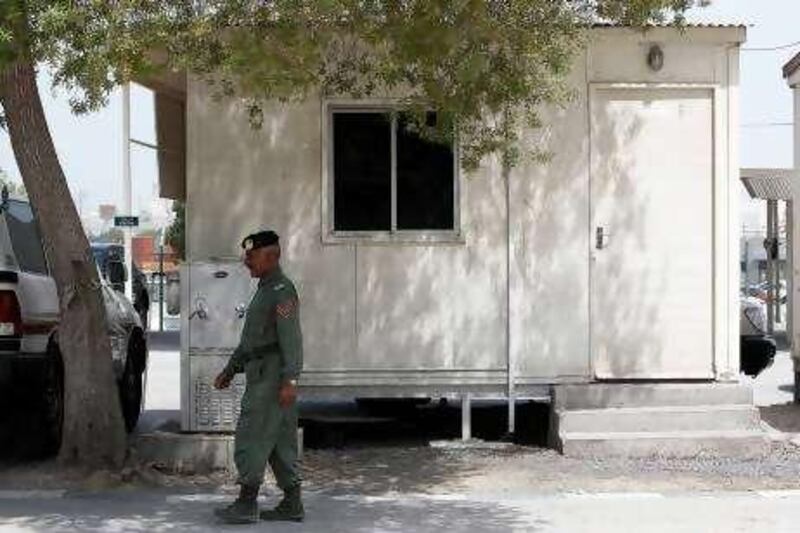DUBAI // From the oversized Fender guitars above the old Hard Rock Cafe to the ghaf trees at the Abu Dhabi border, Jebel Ali Police patrol the largest jurisdiction in Dubai. The 220 staff cover an area of 531 square kilometres, and tackle crimes ranging from illegal alcohol trading and black market diesel in the industrial areas, to keeping order and security in residential areas such as Dubai Marina and Jumeirah Beach Residences.
And they are kept busy. So it may come as a surprise to learn that all that work is done from a humble four-roomed portable building near Jebel Ali Port. Their old office was condemned and demolished four years ago, and the current station has no detention cells. Suspects are transferred to the Ports Police Station at the dry docks in Al Mina - a good 20-minute drive from the makeshift station. The Jebel Ali station was officially set up in 2000 to cope with the policing needs of an expanding city. A small satellite office had been in operation since the Seventies, but it fell under the supervision of Bur Dubai Police Station.
Now, the station is responsible for residential areas including Al Barsha, Jumeirah Lake Tower, Dubai Marina and Jumeirah Beach Residences (JBR), as well as Jebel Ali Industrial Areas, Jebel Ali Port, Sport City and Motor City. "Due to the nature of the area under the station's supervision - a port, industrial areas as well as several residential areas - we have a wide range of security challenges to address," said Lieutenant Colonel Abul al Qader al Bannai, who heads up the police station.
During the last two years, the security requirements of the area have changed, he said. For starters, lower rental prices in Dubai Marina, JLT and Barsha have resulted in an influx of residents from old Dubai, Sharjah and Abu Dhabi. "The big mix of nationalities with different cultural backgrounds and the high number of tourists in the area has also been a challenge," Lt Col al Bannai said. The multitude of different languages can make it difficult to communicate with victims, he explained. And, naturally, it is not uncommon for people of different cultural backgrounds to clash at times. "We overcome this by implementing the law and improving our communication skills," he said.
"We also need to adopt different security procedures depending on which part of the area we are covering," Lt Col al Bannai said. "For instance, we have deployed patrols in golf carts in JBR, in keeping with the touristy nature of the area, and to enable us to reach places we cannot with a normal car." In a novel effort to increase the number of eyes on the lookout, the station ran a campaign to educate security guards in the area. The programme, called Attracting Attention, sought to educate private guards on how to be more observant of criminal behaviour and prevent crime.
"This programme has helped to reduce crimes such as thefts and illegal alcohol trading," Lt Col al Bannai said. The station also coordinated with the Criminal Investigation Department and the Bur Dubai Police Station this summer to carry out a campaign against people residing in the city without visas, who are dubbed "illegals". "The problem of illegals is recurring - as a result of the financial crisis, some workers lost their jobs and did not leave the country," Lt Col al Bannai said.
"This campaign has helped reduce the problem and we caught a number of illegals who were involved in thefts." Despite the challenges, their efforts are bearing fruit. The amount of illegal alcohol seized in the Jebel Ali area has dropped by more than 50 per cent in the first half of this year. About 36 tonnes of illegal alcohol were seized in the first six months of the year, as compared with about 76 tonnes for the same period last year. The drop in illegal alcohol, according to Lt Col al Bannai, has also had an important impact on the reduction of serious crimes in the area. For starters, there are fewer drunken brawls.
And serious crimes, including thefts, rape and murder, have dropped by more than 20 per cent this year, according to Jebel Ali Police. "We know that the challenges are many, but we will continue to develop our programmes to overcome them," Lt Col al Bannai said. wissa@thenational.ae






